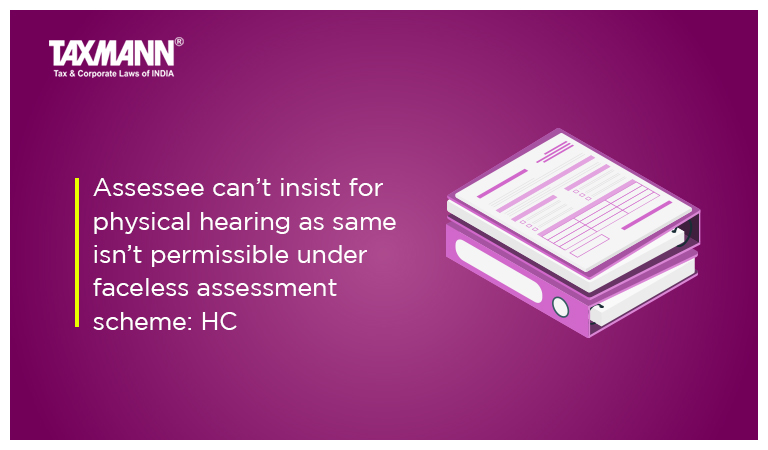Assessee can’t insist for physical hearing as same isn’t permissible under faceless assessment scheme: HC
- Blog|News|Income Tax|
- 2 Min Read
- By Taxmann
- |
- Last Updated on 28 September, 2022

Case Details: Gurumukh Ahuja v. Income-tax Department - [2022] 142 taxmann.com 275 (Madhya Pradesh)
Judiciary and Counsel Details
-
- Sheel Nagu & Maninder S. Bhatti, JJ.
- G.N. Purohit, Sr. Adv. & Nitin Agrawal, Adv. for the Petitioner.
- Sanjay Lal, Adv. for the Respondent.
Facts of the Case
Assessee was an individual and regular income tax assessee. He received notice by which he was called upon to provide details pertaining to his business activities.
The assessee submitted all the information called for and also demanded the opportunity of a personal hearing before the issuance of the final order. However, Assessing Officer (AO) passed the final order without giving the opportunity of personal hearing to the assessee. AO issued notice of demand and notice of penalty as well.
Assessee challenged the assessment order by filing writ petition before the Madhya Pradesh High Court.
High Court Held
The High Court stated that the opportunity for a personal hearing is provided under section 144B(7)(vii), however, it does not postulate that hearing should be ‘physical’. A perusal of notices issued to the assessee makes it clear that by virtue of the Faceless Assessment Scheme, there was no provision for physical hearing and physical hearing was not permissible.
The assessee was well advised by the AO to take recourse to the virtual mode of hearing through the guidelines relating to the Faceless Assessment Scheme. However, the assessee didn’t opt for it and still kept on insisting on physical hearing.
Accordingly, since the request for personal hearing made by the assessee was misconceived as Section 144B(7)(vii) does not postulate a physical hearing, the writ petition filed by him was to be dismissed.
List of Cases Referred to
-
- Mantra Industries Ltd. v. National Faceless Assessment Centre (NFAC or NeAC) [2021] 131 taxmann.com 165/283 Taxman 459/[2022] 441 ITR 467 (Bom.) (para 9)
- Metharam Pinjani v. Income-tax Department [2022] 137 taxmann.com 148/287 Taxman 16 (MP) (para 11)
- Sabic India (P.) Ltd. v. Union of India [2021] 126 taxmann.com 157/280 Taxman 158/434 ITR 563 (Delhi) (para 11)
- CIT v. Vijaybhai N. Chandrani [2013] 35 taxmann.com 580/217 Taxman 138/357 ITR 713 (SC) (para 11).
Disclaimer: The content/information published on the website is only for general information of the user and shall not be construed as legal advice. While the Taxmann has exercised reasonable efforts to ensure the veracity of information/content published, Taxmann shall be under no liability in any manner whatsoever for incorrect information, if any.

Taxmann Publications has a dedicated in-house Research & Editorial Team. This team consists of a team of Chartered Accountants, Company Secretaries, and Lawyers. This team works under the guidance and supervision of editor-in-chief Mr Rakesh Bhargava.
The Research and Editorial Team is responsible for developing reliable and accurate content for the readers. The team follows the six-sigma approach to achieve the benchmark of zero error in its publications and research platforms. The team ensures that the following publication guidelines are thoroughly followed while developing the content:
- The statutory material is obtained only from the authorized and reliable sources
- All the latest developments in the judicial and legislative fields are covered
- Prepare the analytical write-ups on current, controversial, and important issues to help the readers to understand the concept and its implications
- Every content published by Taxmann is complete, accurate and lucid
- All evidence-based statements are supported with proper reference to Section, Circular No., Notification No. or citations
- The golden rules of grammar, style and consistency are thoroughly followed
- Font and size that’s easy to read and remain consistent across all imprint and digital publications are applied



 CA | CS | CMA
CA | CS | CMA
